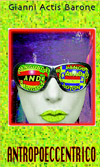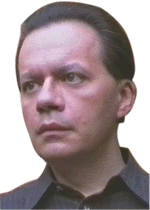Antropoeccentricoby Gianni Actis Baroneintroduced by Tommaso Ottonieri
|
 |
Antropoeccentricoby Gianni Actis Baroneintroduced by Tommaso Ottonieri
|
 |
"Passages" is
an art work coordinated by Manuela Corti, and executed by
the coordinator herself, together with 22 other artists from
all over the world, based on passages from the book
Antropoeccentrico. It is a work in progress on the Internet
since November 1997. The work is also exhibited in the
section "ARTE WEB" of the show "La coscienza luccicante "
(The Sparkling Conscience) September 16th-October 30th at
the Palazzo delle Esposizioni in Rome.
Among others, there is a link to Passages in "Mediamente"
web site, where the project has been pointed out and
introduced by Franco Berardi (Bifo) in the TV broadcast of
Mediamente on April 1st, 1998.
An article by Gianni Romano on the artist Manuela Corti and
her project "Passages" appeared in the magazine Flash Art n.
31, Summer 1998.
 Gianni Actis Barone was born in Bologna in 1960. He lives and works in Bologna and Paris. He pursued a Business degree first, then a Doctorate in Medicine. After obtaining a Diploma from the Academy of Dramatic Art of the Antoniano in Bologna, he attended the company of the "Piccolo" in Milan, and wrote short "pieces" for the thea-tre. He lived abroad for many years (Africa, Brazil, Europe), following his various professions, but never neglecting his theatrical and literary activities. He has collaborated to the magazine "La Corte di Mantova".
Gianni Actis Barone was born in Bologna in 1960. He lives and works in Bologna and Paris. He pursued a Business degree first, then a Doctorate in Medicine. After obtaining a Diploma from the Academy of Dramatic Art of the Antoniano in Bologna, he attended the company of the "Piccolo" in Milan, and wrote short "pieces" for the thea-tre. He lived abroad for many years (Africa, Brazil, Europe), following his various professions, but never neglecting his theatrical and literary activities. He has collaborated to the magazine "La Corte di Mantova".
In 1995 he started publishing with Baobab publishers, and began the production of videos, which participated in numerous exhibits of video art, such as Fondazione Morra (Naples), ElectronicArtCafe' (Turin), VeneziaPoesia, Immagina (Siena), Tecne' (Brescia), CortoMiraggi (Perugia), Immagine Leggera (Palermo).
His literary pieces appeared in magazines, newspapers, anthologies, and books. Notably, the radio plays "Omicidi dimostrativi" and "La pancia" (which in 1990 earned the Orion prize from RAI 3), the short story "Bonburla" and "L'Effetto bomba", the novel "Caneacaso" (Thema Publishers, Bologna and Turin, 1989), and the twoact play "La Cagna di Noc". His last experimental novel, “Antropoeccentrico” (Edizioni dell'Ortica, Bologna 1998) is the literary inspiration of the Internet project "Passages".mail to Gianni Actis Barone
jb.actis@passiopea.net
Passages - PROJECT FOR AN IMAGE, proposed and realizated by Manuela Corti with an international artists group cooperating at the project only by e-mail:
The project has been on web since November 17, 1997.
Every Monday for 23 weeks 4 web pages were published from 4 different artists who interpreted graphically and translated into their own language the same paragraph from an Italian novel: "Antropoeccentrico", by Gianni Actis Barone, published by Edizioni dell'Ortica, Bologna 1998.
The idea for PASSAGES was born from the need to create a communication work not having a matrix specifically determined by the project designer. As a specifically determined matrix, I mean an almost forced path, or maybe a circle within which to shape oneself. Practically, I did not want to provide a visual starting idea on which to build a project, just as visual, to which I would ask to add something already established, albeit within the freedom of graphic expression. In this sense, PASSAGES not only has a double evolvement, it has a third aspect that, from the start, modifies the idea from which the project will be drawn. Therefore the project is "act" only as far as the literary component, while it is "in action" during its development.
The idea, then, begins from several fragments taken from a novel written in Italian. To be precise, the fragments are not chosen casually from each of the chapters, subchapters and unchapters of the novel. It is obvious that my choice is by necessity predetermined, but when I say "not casual" it is because from the start I chose a novel giving the minimum space to action and description, and within the novel I always followed this guideline.
Even in those parts seemingly displaying action, a particular stroke sends one back to the psychological base sustaining the entire novel.
But from this moment the text is not in an original position any more, because the intervention of the translator (the passages were mailed in English) modifies the document linguistic perception of those (the artists) who will refer to it.
A written (translated) text that the artist must interpret without a visual constraint, but just as a written and perceived image appears visually to its own creation, multisensory in the case of Internet and new media.
This second interpretation (although one could say first, the translation problem being a constant) promotes the influence of tongue on language, given the same different linguistic perception of the artist. He/she may respond with stereotypes, moving images, sounds. These all make up another language, the visual one, starting from a common (that is, international) language, that is, however, mastered differently by each individual, and therefore felt by some more strongly than by others. Subject, this one, which includes also the deception of language within a tongue.
The second manipulation, related to the previous one, is the re-translation into one's own mother tongue of the same piece, which therefore appears in three different languages. In this case, interpretation appears to be less arbitrary, but it is influenced anyway by one's own "territory".
The PASSAGES project is therefore a multi-level operation, often finding the artists hesitant as to the way to proceed. Such hesitation constitutes the disorientation of going from one tongue to a language, to return finally to a different tongue.
In this sense the involvement is not only aesthetic but psycho-aesthetic, and it constitutes the method of interaction in the new communication, carried over waves more and more sensorial and less and less intellectual.
Alongside the on line publication, I collected a mail list of about 1000 correspondents, to whom I sent each week a short line from the current passage, thus increasing the communication component of the interaction with the users, who participated with comments and observations by e-mail or in the site Guest Book.
I envision PASSAGES as a huge environment where synchronic and diachronic coexist, and are modified in the same instant in which they appear.
Input enters as finished material, but always at the critical point of a "de facto" transformation. Output is but just waves bouncing with the same predetermination: they leave a memory of their presence, but immediately escape through other waves, carrying away their mold.
In short, we are on the stage that is the world. We are in a space where by words we understand each other still rather poorly, but where images and written words counterpoint voice and sound.
The various latitudes and longitudes are but hypothetical points of that stage, where even the director would have a hard time reproducing actions in the same space or at the precise times. But exactly this tight communication interweaving with some communications, passing over some others, and sometimes hanging over the stage, finds its epilogue in a prologue that is able to define only its preparations.
Communication becomes the event, but not the effect. Communication becomes a new cause, and in the works one proceeds towards new possible arrangements or projects. The task of interdisciplinarity is inherent to the "passages" and it remains as an episode ready to escape towards new demonstrations, to exhibit itself as never-before-shaped, original matter of our biologic universe.